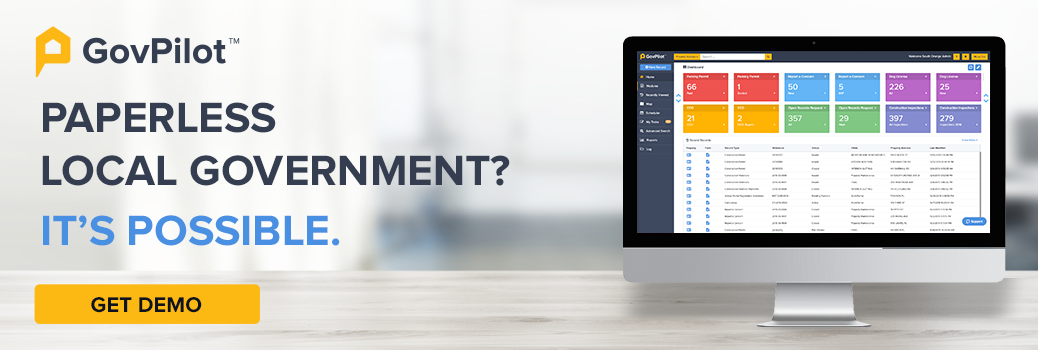Local government will never be the same. A bold take, but nevertheless true. Technology is roaring along in the fast lane, and the world is along for the ride. In just a few short years, we’ve experienced drastic and fundamental changes in how we work, communicate, and live our lives. The public sector is no exception.
Localities across the country have undergone significant shifts in the few years since the COVID-19 pandemic. Some of these changes are admittedly discouraging, such as unprecedented levels of burnout and turnover, but other shifts like the technological transformation of the public sector are hopeful glimpses into the future.
In this article, our goal is to shed light on the impending future of local government, offer insight into what localities can anticipate, and provide strategies for officials attempting to navigate the digital transformation in government. Let’s dive in!
Why the Government Landscape Shifted So Rapidly Since the COVID-19 Pandemic
The onset of the COVID-19 pandemic catapulted local governments into a modern, digital landscape. Social distancing and remote work quickly became the norm, which fundamentally impacted the operations and service delivery of many departments.
The traditional, paper-based processes localities used to rely on soon became ineffective and obsolete as the pandemic illuminated the reality that a more modern approach was necessary to maintain order and ensure government continuity of service.
This led to the rapid digitalization of many government services from online tax filing systems to virtual town hall meetings. While modernization efforts are still in the early stages, the pandemic served as a catalyst for many localities to start their digital journeys much sooner than anticipated.
Consider common local government challenges that municipalities will need to address in the future.
How Government Technology is Shaping the Future of Government
Government technology, or GovTech, is playing a crucial role in shaping the future of government. In just a few short years, public administration has been transformed into a more efficient, transparent, and citizen-centric enterprise.
Integrating technology into public administration enables governments to adapt to changing societal needs and provide innovative solutions to complex problems.
Here are a few ways GovTech is shaping the future of government:
1. Government Cloud Storage
The transition from paper-based data storage to digital data storage is proving to be transformational for municipal and county operations. Paper documents and on-site servers are more susceptible to hacks, physical data loss, inefficiencies, and security breaches.
Cloud storage, on the other hand, offers robust data security measures and regular backup provisions of sensitive government information. With the emergence of digital government data storage, information is accessible to verified officials at any time and location, and can be integrated into government analytics solutions for more informed decision-making and strategic planning. This marks a significant step towards the vision of a future-ready government.
Learn about the most common government data breaches and how governments should be using the cloud.
2. Online Permitting and Licensing
The shift towards online permitting and licensing has been another key development in the digital government landscape. Traditional paperwork and long in-person wait times were not only inconvenient, but the review process was also long and prone to delays.
Digitizing permitting and licensing has streamlined the process considerably and offers a much improved citizen experience. Not to mention the review and approval process of digital applications saves valuable time and resources. Integrating online credit card processing is the cherry on top, ensuring immediate revenue generation with every permit filed.
Consider exactly how permitting software works and ways to improve the citizen experience in government.
3. Modern Government Website Design
The demand for modern, accessible, and streamlined government websites is at an all time high for digital-savvy citizens. But if there’s one thing localities should know, it’s that modern government website design is more than just aesthetics – it’s about better functionality and service delivery.
Modern government websites should serve as a one-stop solution for citizens. From applying to permits to paying taxes, integrating services into one platform saves time for citizens and improves efficiency. Fully functioning websites also play a critical role in promoting transparency in government.
4. Mobile Field Devices
Mobile devices like tablets and smartphones have become essential tools for government officials who work in the field. Being able to conveniently finish work outside the constraints of an office improves efficiency for every city government department.
One of the greatest advantages of mobile field devices is the ability to record and submit records, such as inspection and maintenance reports, in real-time. Not only that, but field workers now have direct access to important information at their fingertips, which cuts down response times and decision-making tasks.
Learn more about how mobile devices are transforming local government work.
5. Artificial Intelligence (AI)
Although early technology, AI has already brought a paradigm shift to the way governments function, ushering in a new era of government operations. AI has the potential to transform most aspects of public administration, making it more efficient, effective, and responsive.
AI technologies enable advanced data visualization, which can facilitate a more in-depth analysis of trends, patterns, and correlations that might otherwise go unnoticed. AI also has the potential to reshape citizen-government communication with the use of AI-powered chatbots and virtual assistants providing real-time, personalized responses to citizen inquiries.
Learn more about AI in government and how to bring AI into your municipality.
How Public Policy is Shaping the Future of Government
Policies are the guiding force of governments. They not only set the framework to implement law, but policies also act as a catalyst for change. With new technologies emerging every day, public policy is being rewritten to incorporate these new cutting-edge tools.
Here are a few examples of policies shaping the future of government:
-
The Infrastructure Bill
On November 6, 2021, Congress passed The Infrastructure Bill, which stands as a landmark policy guiding the investment of billions of dollars to improve national infrastructure. The bill not only promises investments in physical infrastructure, but also in digital infrastructure like broadband access, smart cities, and digital public services.
One key focus of the bill is the use of digital permitting and inspections to expedite project timelines. Digital permitting allows localities to receive, review, and approve permit applications online, eliminating the need for physical paperwork.
Digital inspections, on the other hand, refer to the use of digital tools and technologies, such as drones and augmented reality (AR), to conduct inspections remotely. This not only speeds up the inspection process but also reduces the risk of errors and inaccuracies. Check out GovInspect, our mobile inspection app for governments.
Here are helpful resources about the infrastructure bill and what it means for local governments:
- What local governments need to know about the infrastructure bill
-
Requirements for Governments to Go Digital
In more notable strides towards modernization, some governments are passing laws to compel administrations to adopt and adapt to digital formats. New Jersey and Florida are two examples of states passing laws requiring their administrations to go digital.
New Jersey's electric permit law mandates the use of digital systems for filing, reviewing, and approving construction permits. With this law, New Jersey aims to expedite construction projects and foster economic growth.
In a similar vein, Florida's digital inspection law dictates the transition of construction inspections from a physical to digital format. The law enables real-time, virtual inspections, which saves time and resources as inspectors can review multiple properties without having to physically visit each site.
More states will continue to pass laws that force municipalities to move to digital capacity.
-
Prioritization of Cybersecurity
Cybersecurity is a significant concern for governments worldwide. One way governments are securing the digital landscape is through cybersecurity laws, such as New Jersey’s 3-Day Cyber Reporting Law.
This landmark piece of legislation mandates that any cybersecurity incident affecting a public entity must be reported within three days of its occurrence. Not only does the law emphasize the importance of timely communication of cyber incidents, but it also sets an important national precedent.
GovPilot takes significant measures to ensure the highest level of security of its digital assets, including comprehensive security infrastructure that encompasses physical, network, application, and data-level security. Review GovPilot’s cybersecurity standards being deployed to keep government data safe.
Tap into Operating Systems to Modernize Local Government with GovPilot
As the tides of change sweep across government, it’s imperative for local governments to embrace digital operating systems throughout the modernization journey. Modern operating systems, like the solutions offered by GovPilot, enable workflow automations, data-driven decision making, and the secure handling of sensitive government data. To get started with GovPilot, book a free 15-minute consultation.
Future of Local Government FAQs
1. What does the future of government look like?
The future of government looks increasingly digital. As technology continues to evolve, we’re seeing more governments adopting innovative solutions designed to streamline processes, create efficiencies, reduce costs, and improve the citizen experience. Advanced technology will also enable more efficient and secure data management and facilitate data-driven decision making. The future of government will likely also involve an increased use of AI, machine learning, and potentially blockchain technology.
2. What innovations are shaping the future of government?
Several innovations are shaping the future of government. Digital operating systems are playing a crucial role in modernizing public service but automating tasks and optimizing workflows. AI and machine learning are being used to analyze large amounts of data for better decision making. Cloud computing has also revolutionized data storage, providing secure, accessible, and cost-effective solutions for data management.
3. How has government technology evolved in recent years?
In recent years, government technology has seen a remarkable evolution. There’s been a significant shift from traditional paper-based systems to digital platforms for many government services. Advanced technology, such as AI and machine learning, have started to take root in some government functions. The use of cloud services like the Azure GovCloud has also increased, providing an efficient solution for data storage and access. Governments have also been able to drastically improve the citizen experience through the deployment of modern web design, apps, and online platforms designed to deliver government services.
Read on:
- How the Government Will Use Blockchain
- Local Government Crisis Communication
- AI in Government in 2023 and Beyond: Bringing Artificial Intelligence to Your Municipality With GovPilot
- What is Municipal Software? Understanding Government Software for Municipalities & Counties
- How Mobile Devices Are Transforming Local Government Work in the Field 2023
- Local Government Vacant Property Management: Combating Blight and Driving Economic Development









